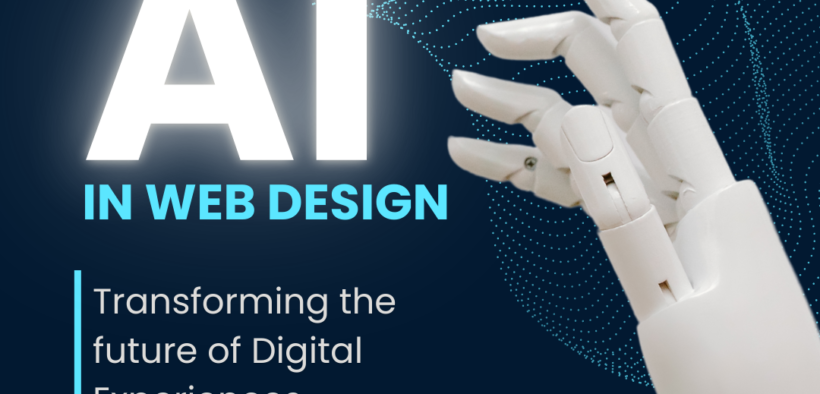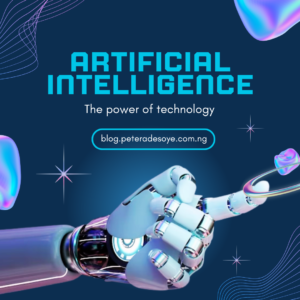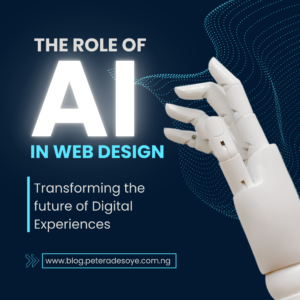The Role of AI In Web Design: Transforming the Future of Digital Experiences
Share

Artificial Intelligence (AI) is revolutionizing the web design industry, bringing new possibilities and efficiencies to the creative process. As technology continues to advance, AI is playing an increasingly significant role in how websites are designed, developed, and optimized. From automating routine tasks to personalizing user experiences, AI is reshaping the future of web design.

1. Automating Design Processes
One of the most impactful ways AI is influencing web design is through automation. AI-powered tools can now handle many aspects of the design process that were once time-consuming and labor-intensive. For example, AI can automatically generate design layouts, choose color schemes, and even suggest font pairings based on the content and target audience. This not only speeds up the design process but also allows designers to focus more on creativity and strategy rather than repetitive tasks. Recommended AI tools for this category includes Adobe Sensei, Canva, Figma with FigJam, Let’s Enhance, and Designify.
2. Enhancing User Experience (UX)
AI is also transforming how web designers approach user experience (UX). Through machine learning algorithms, AI can analyze user behavior, preferences, and interactions in real time. This data allows for the creation of personalized web experiences tailored to individual users, improving engagement and satisfaction. AI-driven chatbots and virtual assistants further enhance UX by providing immediate support and guidance, making websites more interactive and user-friendly. Recommended AI tools for this category includes Hotjar, IBM Watson, Qualtrics XM, Adobe XD with Auto-Animate, and Crystal.
3. Optimizing Content Creation
Content creation is another area where AI is making significant strides. AI-powered tools can generate content ideas, write copy, and even optimize content for search engines. These tools analyze trends, keywords, and audience preferences to create content that resonates with users and ranks higher in search results. This helps web designers and marketers create more effective and targeted content strategies. Recommended AI tools for this category includes Copy.ai, Grammarly, Jasper, Frase, and Surfer SEO.
4. Improving SEO and Performance
AI is also crucial in improving the search engine optimization (SEO) and performance of websites. AI tools can analyze vast amounts of data to identify SEO opportunities, such as keyword optimization, link-building strategies, and content gaps. Additionally, AI can monitor website performance in real time, identifying issues like slow loading times or broken links, and suggest fixes to enhance the overall user experience. Recommended AI tools for this category includes Ahrefs, SEMrush, Moz Pro, Surfer SEO, and MarketMuse.
5. Innovating Visual Design
AI is pushing the boundaries of visual design by enabling designers to experiment with new styles, layouts, and formats. AI-driven design platforms can generate multiple design variations, allowing designers to explore a wider range of possibilities and choose the most effective one. This innovation in visual design leads to more dynamic, visually appealing websites that capture users’ attention and drive engagement. Recommended AI tools for this category includes DALL-E, Runway ML, DeepArt, Artbreeder and Let’s Enhance.
6. Future Implications of AI in Web Design
As AI technology continues to evolve, its role in web design will only expand. We can expect AI to become more integrated into design workflows, offering even more advanced tools and capabilities. The future of web design will likely see AI playing a central role in creating fully automated, intelligent websites that adapt to user needs in real time. Designers who embrace AI will be better equipped to create innovative, efficient, and user-centric websites.
7. AI-Driven Analytics and Data Interpretation
Another crucial role AI plays in web design is through advanced analytics and data interpretation. AI-powered analytics tools can process vast amounts of data from user interactions, providing designers with actionable insights. This data helps in understanding user behavior, preferences, and pain points, which can be used to refine the website’s design and functionality. For example, AI can track how users navigate through a website, identifying which elements are most effective and which may need improvement. This level of insight enables designers to make data-driven decisions, ensuring that the website meets user expectations and business goals. Recommended AI tools for this category includes Google Analytics 4 (GA4), Tableau, IBM Watson Analytics, Microsoft Power BI, and Looker.
8. AI and Accessibility
AI is also making significant strides in improving web accessibility. Designing websites that are accessible to users with disabilities is a critical aspect of modern web design. AI tools can automatically check for accessibility issues, such as poor color contrast or missing alt text, and suggest solutions to ensure compliance with accessibility standards. Moreover, AI-driven technologies like voice recognition and image description generators are helping to create more inclusive web experiences, making it easier for all users to interact with digital content. Recommended AI tools for this category includes Axe by Deque, Wave by WebAIM, Siteimprove Accessbility, Accessibility Insights, and AChecker.
9. Collaborative AI Tools
Collaboration in web design is being enhanced by AI-powered tools that facilitate teamwork across different roles. AI-driven platforms allow designers, developers, and content creators to work together seamlessly, even if they are in different locations. These tools can automate the sharing of updates, suggest revisions, and even predict potential issues before they arise. For example, AI can analyze a designer’s draft and provide feedback based on best practices or past project successes, streamlining the collaboration process and reducing the time spent on revisions. Recommended AI tools for this category includes Github Copilot, CodeStream, Figma, Zeplin, and Visual Studio Live Share.
10. Ethical Considerations and AI in Web Design
As AI becomes more integrated into web design, ethical considerations are becoming increasingly important. Designers must be mindful of how AI-driven decisions impact user privacy, data security, and overall user experience. For instance, while AI can personalize content, it’s crucial to ensure that user data is handled responsibly and transparently. Additionally, designers should be aware of potential biases in AI algorithms that could affect the inclusivity and fairness of the websites they create. By considering these ethical implications, designers can leverage AI to create websites that are not only innovative but also trustworthy and user-centric.
11. AI in E-commerce Web Design
In the realm of e-commerce, AI is revolutionizing how online stores are designed and operated. AI can analyze customer data to create personalized shopping experiences, recommend products, and even predict future buying behaviors. This level of personalization can significantly increase conversion rates and customer loyalty. Furthermore, AI-driven chatbots in e-commerce sites provide real-time customer support, answering queries, guiding users through the purchasing process, and improving overall customer satisfaction. Recommended AI tools for this category includes Nosto, LimeSpot, Shopify’s Kit, Algolia, and Clerk.io.

Conclusion
The role of AI in web design is multifaceted, encompassing automation, user experience enhancement, content optimization, and much more. As AI technology continues to advance, its influence on web design will grow, offering even greater opportunities for innovation and efficiency.
For web designers, embracing AI means staying ahead of the curve and delivering cutting-edge, user-focused websites that meet the ever-evolving demands of the digital world. By understanding and leveraging AI’s capabilities, designers can create web experiences that are not only aesthetically pleasing but also highly functional, personalized, and ethical.
Subscribe to our Swift Magazine newsletter to get first hand updates on new articles about AI and Web Design.











